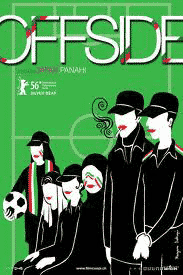Index relies entirely on the support of donors and readers to do its work.
Help us keep amplifying censored voices today.
Tomorrow, the Cinema Office of Iran’s Ministry of Culture and Islamic Guidance must decide on the country’s submission for the Best Foreign Language Film for the 2012 Oscars. The obvious choice would be A Separation, director Asghar Frahadi’s latest film that screened worldwide this year with overwhelming success. In An Iranian Movie ‘Masterpiece’…And why it may not make it to the Oscars, Ali Chenar presents the convoluted issues and politics at play, exposing a whole new dimension to censorship of film in Iran.
Of course the impact on any artist attempting to pursue their work in this industry is manifold. This month saw the US release of the controversial Circumstance (winner of Sundance Audience Award 2011), a film exploring lesbian love in Iran, and director Maryam Keshavarz felt compelled to make a “goodbye” trip to the country as soon as the work was complete, on the clear understanding that she would become a target of the regime once it was released. The official trailer ends with “Let no love fall victim to circumstance. Freedom is a human right.” And circumstance is exactly what filmmakers must constantly overcome — in the choices that they make and the reality that ensues.
Award-winning director Jafar Panahi under house arrest since December 2010, with an imposed 20-year ban on making films, has bravely played with the limitations of this ban by collaborating on This Is Not A Film, a film poignantly showing the banality of Panahi’s life under house arrest. The film was smuggled out of Iran on a USB pen and screened at Cannes this year. The reels keep turning.
On Monday, Iran prevented filmmaker Mojtaba Mirtahmasb from boarding a flight to Paris in order to attend the Toronto film festival, where his documentary about the detained filmmaker Jafar Panahi will be shown. The film shows a day in the life of Panahi, who is currently serving a six-year prison sentence for a film he made about the unrest in Iran following the disputed election in 2009.
 Index on Censorship calls on Ayatollah Sadeq Larijani, head of the judiciary in Iran, to overturn the sentences handed down this week to the film directors Jafar Panahi and Mohammad Rasoulof. Jafar Panahi was sentenced this week to six years in prison for “colluding in the gathering and making of propaganda against the regime”. He is also banned from making films, writing scripts, travelling abroad and talking to the media for 20 years. Mohammad Rasoulof also received a prison sentence of six years.
Index on Censorship calls on Ayatollah Sadeq Larijani, head of the judiciary in Iran, to overturn the sentences handed down this week to the film directors Jafar Panahi and Mohammad Rasoulof. Jafar Panahi was sentenced this week to six years in prison for “colluding in the gathering and making of propaganda against the regime”. He is also banned from making films, writing scripts, travelling abroad and talking to the media for 20 years. Mohammad Rasoulof also received a prison sentence of six years.
In a letter to Ayatollah Larijani, Index on Censorship’s chief executive John Kampfner says:
We would like to remind you that Iran’s own constitution guarantees the right to freedom of expression, the essential condition for any artist to engage in their work and enjoy the freedom to create. We therefore ask you to guarantee this most fundamental of human rights to Mr Panahi, Mr Rasoulof and all artists, academics and journalists currently facing similar sentences.
Index on Censorship urges the Iranian government to recognise Jafar Panahi and Mohammad Rasoulof as ambassadors for Iran’s creative culture, instead of treating them as criminals. “The Islamic Republic’s continuing crackdown on artists, journalists and writers can only harm the future of its people,” writes John Kampfner in his letter.
Jafar Panahi is amongst Iran’s leading film directors. His first film The White Balloon won the Camera d’Or at the Cannes film festival in 1995 and he was awarded the Golden Lion in 2000 for his film The Circle.
Speaking in support of Jafar Panahi, documentary filmmaker Kim Longinotto says:
Jafar Panahi has been an inspiration for me and my friends for many years. His poetic, sensitive and gripping films tell complex stories with well-rounded characters that he treats with great affection and respect. His films never tell us what to think, or give easy answers — they allow us to discover things for ourselves. He gives me hope for a future where men and women can truly identify with one another’s experiences.
Iranian director Jafar Panahi has been sentenced to six years in prison for “colluding in gathering and making propaganda against the regime”. Panahi has also been banned from directing films or speaking to the press for 20 years.